An ansible is a category of fictional devices or a technology capable of near-instantaneous or faster-than-light communication. It can send and receive messages to and from a corresponding device over any distance or obstacle whatsoever with no delay, even between star-systems. As a name for such a device, the word "ansible" first appeared in a 1966 novel by Ursula K. Le Guin. Since that time, the term has been broadly used in the works of numerous science-fiction authors, across a variety of settings and continuities. A related term is ultrawave.
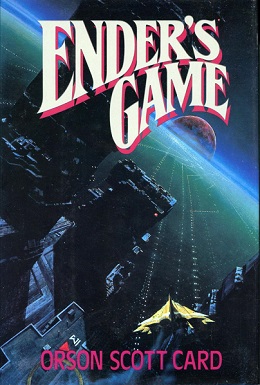
Ender's Game is a 1985 military science fiction novel by American author Orson Scott Card. Set at an unspecified date in Earth's future, the novel presents an imperiled humankind after two conflicts with an insectoid alien species they dub "the buggers". In preparation for an anticipated third invasion, Earth's international military force recruits young children, including the novel's protagonist, Andrew "Ender" Wiggin, to be trained as elite officers. The children learn military strategy and leadership by playing increasingly difficult war games, including some in zero gravity, where Ender's tactical genius is revealed.
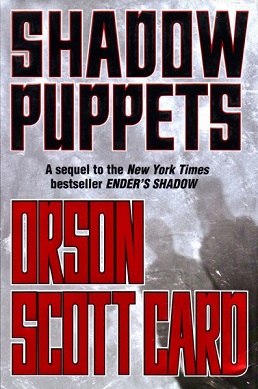
Shadow Puppets is a science fiction novel by American author Orson Scott Card, published in 2002. It is the sequel to Shadow of the Hegemon and the third book in the Ender's Shadow series. It was originally to be called Shadow of Death.

Ender's Shadow (1999) is a parallel science fiction novel by the American author Orson Scott Card, taking place at the same time as the novel Ender's Game and depicting some of the same events from the point of view of Bean, a supporting character in the original novel. It was originally to be titled Urchin, but it was retitled Ender's Shadow prior to release. Ender's Shadow was shortlisted for a Locus Award in 2000.
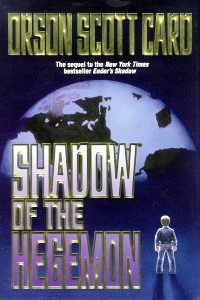
Shadow of the Hegemon (2000) is a science fiction novel by American writer Orson Scott Card, the second novel in the Ender's Shadow series. It is also the sixth novel in the Ender's Game series. It is told mostly from the point of view of Bean, a largely peripheral character in the original novel Ender's Game but the central protagonist of the parallel narrative Ender's Shadow.Shadow of the Hegemon was nominated for a Locus Award in 2002.

Shadow of the Giant (2005) is a science fiction novel by American writer Orson Scott Card, the fourth novel in his Ender's Shadow series, also called the Bean Quartet.
Andrew "Ender" Wiggin is a fictional character from Orson Scott Card's 1985 science fiction novel Ender's Game and its sequels, as well as in the first part of the spin-off series, Ender's Shadow. The book series itself is an expansion of Card's 1977 short story "Ender's Game."
The Ender's Game series is a series of science fiction books written by American author Orson Scott Card. The series started with the novelette Ender's Game, which was later expanded into the novel of the same title. It currently consists of sixteen novels, thirteen short stories, 47 comic issues, an audioplay, and a film. The first two novels in the series, Ender's Game and Speaker for the Dead, each won both the Hugo and Nebula Awards.
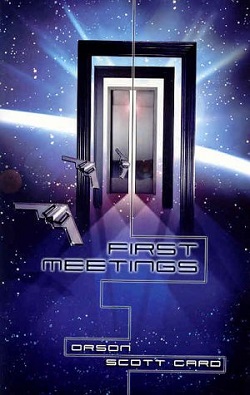
First Meetings (2002) is a collection of science fiction short stories by American writer Orson Scott Card, belonging to his Ender's Game series. Tor Books republished the book in 2003 under the titles First Meetings in the Enderverse and First Meetings in Ender's Universe and included the more recent "Teacher's Pest", a story about the first meeting of Ender's parents.

Ender's Game is a 2013 American military science-fiction action film based on Orson Scott Card's 1985 novel of the same name. Written and directed by Gavin Hood, the film stars Asa Butterfield as Andrew "Ender" Wiggin, a gifted child sent to an advanced military academy in space to prepare for a future alien invasion. The supporting cast includes Harrison Ford, Hailee Steinfeld, Viola Davis, Abigail Breslin, and Ben Kingsley.
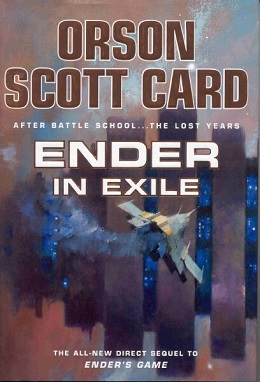
Ender in Exile is a science fiction novel by American writer Orson Scott Card, part of the Ender's Game series, published on November 11, 2008. It takes place between the two award-winning novels Ender's Game and Speaker for the Dead. It could also be considered a parallel novel to the first three sequels in the Shadow Saga, since the entirety of this trilogy takes place in the span of Ender in Exile. The novel concludes a dangling story line of the Shadow Saga, while it makes several references to events that take place during the Shadow Saga. From yet another perspective, the novel expands the last chapter of the original novel Ender's Game. On the one hand, it fills the gap right before the last chapter, and on the other hand, it fills the gap between the last chapter and the original (first) sequel. Ender in Exile begins one year after Ender has won the bugger war, and begins with the short story "Ender's Homecoming" from Card's webzine Intergalactic Medicine Show. Other short stories that were published elsewhere are included as chapters of the novel.
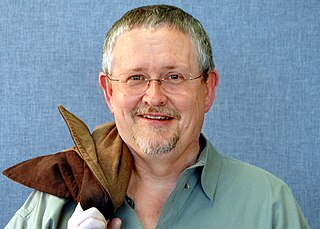
Orson Scott Card is an American writer known best for his science fiction works. He is the only person to have won a Hugo Award and a Nebula Award in consecutive years, winning both awards for his novel Ender's Game (1985) and its sequel Speaker for the Dead (1986). A feature film adaptation of Ender's Game, which Card coproduced, was released in 2013. Card also wrote the Locus Fantasy Award-winning series The Tales of Alvin Maker (1987–2003). Card's fiction often features characters with exceptional gifts who make difficult choices with high stakes.

A War of Gifts: An Ender Story is a 2007 science fiction novella by American writer Orson Scott Card. This book is set in Card's Ender's Game series and takes place during Ender Wiggin's time at Battle School as described in Card's novels Ender's Game and Ender's Shadow.
Ender's Game is a series of comic book adaptations of a series of science fiction novels of the same name written by Orson Scott Card and published by Marvel Comics that began in October 2008. However, some have new content not included in the novels. The series, like the novels they are based on, are set in a future where mankind is facing annihilation by an aggressive alien society, an insect-like race known colloquially as "Buggers" but more formally as "Formics". The central character, Andrew "Ender" Wiggin, is one of the child soldiers trained at Battle School to be the future leaders of the protection of Earth. The year is never specified, although the ages of the Wiggin children are bound to change throughout space, taking in the relativity of space and time.

Earth Unaware is a science fiction novel by Orson Scott Card and Aaron Johnston in the Ender's Game series. Published in 2012, it is the first book of a prequel trilogy to Ender's Game. The novel is set before Ender Wiggin is born and tells the story of the first Formic War. Earth Afire, the second book in the trilogy, was released on June 4, 2013, and the conclusion, Earth Awakens, was released June 10, 2014.

Brad R. Torgersen is an American science fiction author whose short stories regularly appear in various anthologies and magazines, including Analog Science Fiction and Fact and Orson Scott Card's Intergalactic Medicine Show.
"Gloriously Bright" is a science fiction short story by American writer Orson Scott Card, set in his Ender's Game universe. It tells the story of Han Qing-jao and Si Wang-mu as they interact with Jane, the gods of Path, the Starways Congress, and the knowledge of OCD. It appears in the January 1991 issue of Analog Science Fiction and Fact.
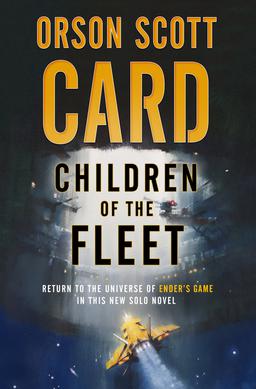
Children of the Fleet is a science fiction novel by American writer Orson Scott Card. The title of the novel was announced by the author on 12 November 2015, and it was released on October 10, 2017.












